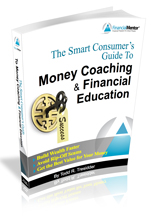A book came my way titled The Smart Consumer’s Guide to Money Coaching & Financial Education by Todd R. Tresidder of the website Financial Mentor. He’s a financial adviser/coach with a lot of products geared towards helping people invest their money so they can live a life without financial worry.

The basic premise of the book is that every person would do better in life and business if they had a better knowledge of finances and financial issues. The reality is that most of us don’t learn anything about finances in school, certainly not how to manage our money. It puts us at a disadvantage whenever we enter the real world. Some people never learn good principles, which is tragic. This book hopes to conquer some of that.
Tresidder talks early about 15 reasons why people should grow their financial intelligence. I totally agree with all 15 of them, which are more his telling us the reasons that get people finally thinking about their financial independence. Three in particular stick out in my mind:
- You don’t know where to get started and would like a step-by-step blueprint so that you can eliminate the fear and actually persist with enough consistency to reach the goal.
- You want to grow your passive revenue to exceed your expenses so that you can stop working for money and start enjoying it instead.
- You want “true wealth” and not just more money… meaning you want to balance your life while working toward financial freedom so that you don’t make the mistake of sacrificing your family, health, or a fulfilling life in pursuit of money.
These resonate with me because they address the issue of financial freedom, being able to pretty much spend your money the way you want because you have enough money to be able to do that while taking care of everything else. Who would have problems with that?
Next comes the topic of how one gets financial education and the costs of getting it. The concept of trying to figure out not only what the information is worth to you but how you learn things best sometimes seems to be a dichotomy, and yet it’s important to figure out. Do you need to spend $2,000 to go to a class, or $500 a month for someone to coach you through things, or $800 a year for someone to take you through things step by step or to do it all for you or maybe just spend $25 for a book or book on tape because that’s all you need? Overall, he’s stressing the importance of getting a good financial education is important, but making sure you do what’s right for you is equally important.
After that, there’s a section giving ideas on how to know that you’ve selected the wrong method for you to learn, tips on picking a money coach if that’s what you want to do, and deciding which type of money coach you’d like. At this point you know that the book is geared towards the premise that having a money coach is in your best interest, and that’s the point where I go off opinion more than what the rest of the book has to say.
It’s important for all of us to know more about our finances and how it all works. Whether it’s a money coach or someone managing your finances in another way, there is an acknowledgement that for most of us it’s hard figuring everything out on our own. Pretty much like most things in life, having someone help us could help us get further ahead.
A major rule of thumb always says that one has to spend money to make money. How one spends their money and how much is another thing. You can pay for coaching, advisors or even things like a free wealth building blueprint, which you can get at this link, that contains a book, a mini course and an audio CD.
Also, if you check out this link, you’ll see that the book has turned into a webpage with general information and the opportunity to request a different free ebook. There’s nothing wrong with free from where I sit, especially if it helps you gain financial knowledge.
As with anything else you’ll get out of it what you can put into it. You can review the material and decide if you’re willing to do it on your own, or want to hire someone to help you out. People always do better when they’re held accountable by someone, so that might be a way to go. With advisors, they tend to do it all for you and then tell you what they did, and you probably don’t remember anything 10 minutes after they left. But if you’re not up for the intensity, then coaching might not be for you.
It wouldn’t hurt you to check out the book or other products on the website to see what your options are, because anything you can learn that helps you financially and long term is always a good thing. 🙂

